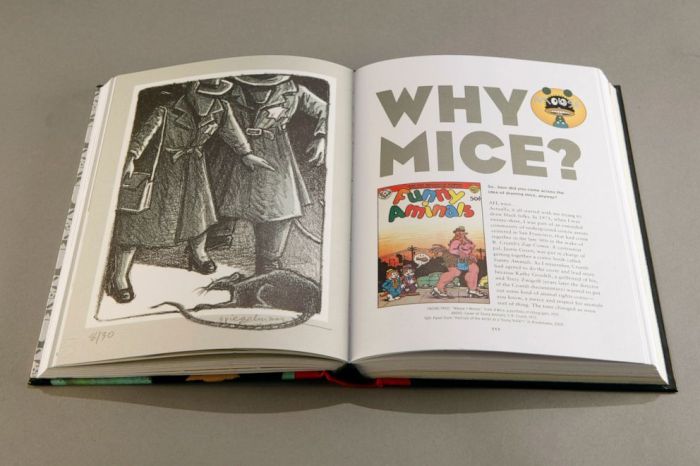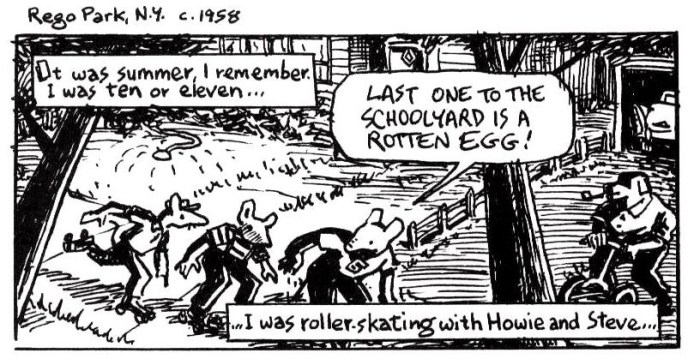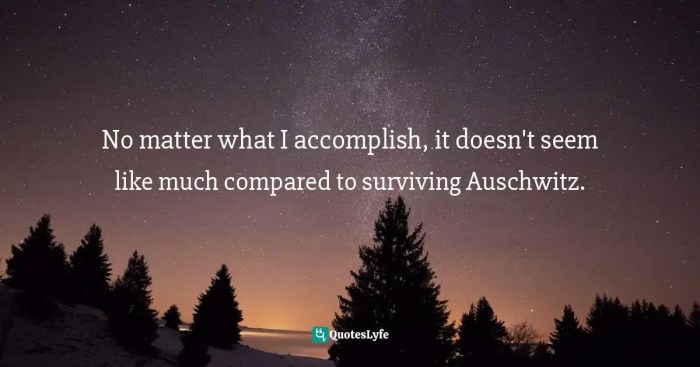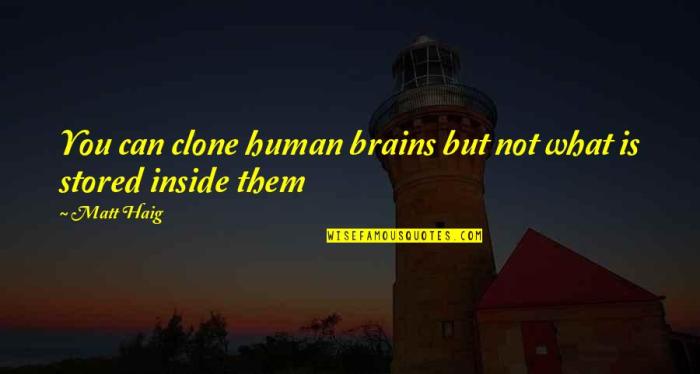Quotes from the book maus – “I can’t believe you’re a cat,” says Art Spiegelman to his father in the graphic novel Maus, a seminal work that explores the complexities of the Holocaust through the lens of a father and son’s relationship. This profound quote encapsulates the essence of the book, as it delves into the depths of identity, memory, and the enduring legacy of trauma.
Maus is a powerful and poignant narrative that utilizes quotes as a means to convey deep truths and emotions. Through an analysis of these quotes, we can gain insights into the characters’ inner struggles, the historical context of the Holocaust, and the universal themes that transcend time and place.
Context of Quotes

The quotes in the book Mausby Art Spiegelman are drawn from interviews with his father, Vladek Spiegelman, a Holocaust survivor. The quotes provide a first-hand account of Vladek’s experiences during the Holocaust and offer insights into the impact of the trauma on his life.
The quotes are significant because they humanize the victims of the Holocaust and help readers understand the horrors they endured. They also provide a valuable historical record of this dark period in human history.
Characters and Motivations
The quotes in Mausare spoken by a variety of characters, including Vladek Spiegelman, his wife Anja, and their son Art. Each character has their own motivations for speaking, and their quotes reflect their unique perspectives on the Holocaust.
- Vladek Spiegelman:Vladek’s quotes are often characterized by his dry wit and gallows humor. He uses these coping mechanisms to deal with the trauma he experienced during the Holocaust.
- Anja Spiegelman:Anja’s quotes are more emotional and reflect her deep pain and loss. She struggles to come to terms with the horrors she witnessed during the Holocaust.
- Art Spiegelman:Art’s quotes are often reflective and introspective. He uses his art to explore his father’s experiences and the impact of the Holocaust on his own life.
Symbolism and Metaphors
The quotes in Maus are rich in symbolism and metaphors, adding depth and complexity to the narrative. These literary devices allow Spiegelman to convey deeper messages about the Holocaust and its lasting impact on survivors.
Symbolic Meanings
Many objects and characters in Maus carry symbolic meanings. For instance, the mice represent the Jews, persecuted and hunted by the cats, who symbolize the Nazis. The use of animals as symbols creates a sense of distance and abstraction, allowing readers to reflect on the broader themes of prejudice and discrimination.
Metaphors of Survival
The quotes often use metaphors to convey the struggles and resilience of Holocaust survivors. For example, the quote “I’m a survivor, but I’m not a hero” suggests that survival is not always about grand acts of courage, but about enduring the unimaginable.
Recurring Themes
Several recurring themes emerge from the symbolism and metaphors in the quotes. These include:
- The fragility and resilience of human life
- The power of memory and storytelling
- The importance of facing the past to prevent future atrocities
Character Development

The quotes in Mausprovide a deep insight into the inner thoughts and emotions of the characters. They reveal the characters’ motivations, fears, and hopes, and their impact on the characters’ development and relationships.
Artie’s Emotional Journey
One of the most striking examples of character development is Artie’s emotional journey. At the beginning of the novel, Artie is a troubled and angry young man. He is haunted by the memories of the Holocaust and struggles to come to terms with his father’s experiences.
- “I don’t know what to do with my life. I don’t know who I am.”
- “I’m so angry. I’m angry at my father for not telling me the truth. I’m angry at the Nazis for what they did to him.”
As the novel progresses, Artie begins to heal from his trauma. He learns to forgive his father and to accept his own identity. By the end of the novel, Artie is a more mature and compassionate young man.
- “I’m not angry anymore. I’m just sad.”
- “I’m proud of my father. He survived the Holocaust, and he taught me the importance of never giving up.”
Historical and Cultural Context
Maus was written in the late 1980s and early 1990s, a time of significant social and political change. The Cold War was ending, and the world was grappling with the rise of new global powers and the challenges of globalization.
In the United States, the 1980s and 1990s were a time of economic prosperity and cultural conservatism. The Reagan administration promoted a free-market economy and a strong military, while the rise of the religious right led to a backlash against social liberalism.
Relevance to Contemporary Society
The quotes from Maus continue to resonate with readers today because they speak to universal themes of identity, prejudice, and the human cost of war. In a world that is increasingly divided by conflict and intolerance, Maus reminds us of the importance of empathy and understanding.
Literary Techniques: Quotes From The Book Maus
Mausis a powerful graphic novel that employs a range of literary techniques to enhance the impact and meaning of its narrative. These techniques include irony, foreshadowing, and imagery, which contribute to the book’s emotional depth, historical significance, and exploration of complex themes.
Irony
Irony is used in Mausto highlight the absurdity and tragedy of the Holocaust. For example, the fact that the Nazis, who claimed to be racially superior, were ultimately defeated by the Allied forces, many of whom were Jewish, is a bitter irony.
Foreshadowing
Foreshadowing is used in Mausto create a sense of suspense and inevitability. For example, the frequent references to the Holocaust throughout the book foreshadow the tragic events that will eventually unfold.
Imagery
Imagery is used in Mausto create vivid and memorable scenes. For example, the depiction of the gas chambers as “showers” is a powerful and haunting image that conveys the horror of the Holocaust.
Comparison to Other Works
Maus, with its unique graphic novel format and exploration of the Holocaust, invites comparison to other literary works that have tackled similar themes and employed innovative storytelling techniques.
The book Maus is a powerful graphic novel that tells the story of the Holocaust through the eyes of a survivor. The book is full of powerful quotes that can help us to understand the horrors of the Holocaust and the importance of fighting against hatred and intolerance.
One of the most famous quotes from the book is, “The world is a dangerous place, not because of those who do evil, but because of those who look on and do nothing.” This quote is a reminder that we all have a responsibility to speak out against injustice and to fight for what is right.
If you’re interested in learning more about the book Maus, I recommend checking out the muse on fame chapter 15 . This chapter provides a deeper analysis of the book’s themes and characters.
Similarities to Art Spiegelman’s Other Works
Spiegelman’s earlier work, Breakdowns, shares several similarities with Maus. Both works use fragmented narratives, stream-of-consciousness, and meta-textual elements to explore personal experiences and historical trauma.
- Fragmentation and Non-Linearity: Breakdownsand Maususe fragmented narratives and non-linear structures to reflect the psychological effects of trauma and the difficulty of coming to terms with the past.
- Stream-of-Consciousness:Spiegelman employs stream-of-consciousness techniques in both works to capture the raw emotions and thoughts of his characters.
- Meta-Textuality: Mausand Breakdownsfeature meta-textual elements, such as the author’s direct interventions and reflections on the process of creating the work, which add layers of self-reflexivity and complexity.
Differences from Elie Wiesel’s Night
While both Mausand Elie Wiesel’s Nightdepict the horrors of the Holocaust, they approach the subject from distinct perspectives and employ different literary techniques.
- Autobiographical vs. Fictional: Mausis a fictionalized autobiography, while Nightis a memoir. This difference influences the tone and perspective of the narratives.
- Animal Symbolism: Maususes animal symbolism to represent different groups of people, which adds a layer of abstraction and allegory to the story.
- Focus on Psychological Impact: Mausplaces a greater emphasis on the psychological impact of the Holocaust on its survivors, while Nightfocuses more on the physical and emotional horrors experienced during the camps.
Impact of Comparisons
Comparing Mausto other literary works provides insights into Spiegelman’s unique approach to storytelling and his exploration of complex themes. It also allows readers to draw connections between different representations of the Holocaust and to consider the impact of literary form on the interpretation of historical events.
Artistic Elements

The visual representation of the quotes from Mausprovides a unique way to explore the novel’s themes and messages. The table format allows for an organized and visually appealing presentation of the quotes, highlighting their key themes and messages.
Table of Quotes
| Quote | Context | Theme |
|---|---|---|
“I don’t care what you call me, as long as it’s not late for dinner.”
|
Art Spiegelman’s father, Vladek, is a Holocaust survivor who often jokes about his experiences. This quote reflects his ability to find humor even in the darkest of times. | Resilience |
“If you can’t beat them, join them.”
|
Vladek Spiegelman’s pragmatic advice to his son, Art, reflects the difficult choices that Holocaust survivors had to make in order to survive. | Survival |
“The only way to fight fascism is to never forget it.”
|
Art Spiegelman’s powerful statement highlights the importance of remembering the Holocaust and fighting against all forms of intolerance. | Historical Memory |
Quotation Analysis Examples

Mausby Art Spiegelman is a powerful graphic novel that explores the complexities of the Holocaust through the lens of a cat-and-mouse allegory. The book is filled with memorable and thought-provoking quotes that illuminate the themes of identity, survival, and the legacy of trauma.
The Power of Metaphor
One of the most striking aspects of Mausis its use of metaphor. Spiegelman’s decision to depict Jews as mice and Nazis as cats creates a powerful visual representation of the power dynamics and dehumanization that characterized the Holocaust.
“I was a mouse. I was a Jew. And I was trapped.”
This quote from Vladek, the narrator’s father, captures the sense of powerlessness and isolation that many Jews felt during the Holocaust. The metaphor of the mouse conveys the vulnerability and fear that Jews experienced as they were hunted and persecuted by the Nazis.
The Importance of Memory
Mausalso explores the importance of memory and the ways in which the past can continue to shape the present. Spiegelman’s decision to tell his father’s story in the form of a graphic novel highlights the power of storytelling as a means of preserving and transmitting history.
“I wanted to draw a picture of the Holocaust, but I couldn’t. I didn’t know how. So I drew a picture of my father instead.”
This quote reveals Spiegelman’s struggle to find a way to express the unspeakable horrors of the Holocaust. By drawing his father’s story, Spiegelman creates a powerful and accessible way for readers to understand the impact of the Holocaust on both individuals and families.
The Legacy of Trauma, Quotes from the book maus
Mausalso explores the lasting effects of trauma. The Holocaust left an indelible mark on the lives of survivors and their descendants. Spiegelman’s own experiences as the son of a Holocaust survivor shape the way he tells his father’s story.
“I’m not my father. I’m not a survivor. But I’m a son. And I’m telling his story.”
This quote highlights the complex relationship between survivors and their children. Spiegelman’s decision to tell his father’s story is both an act of remembrance and a way of coming to terms with the legacy of the Holocaust.
Questions and Answers
What is the significance of the quote “I can’t believe you’re a cat”?
This quote reflects the protagonist’s struggle to reconcile his father’s human experiences with his animalistic depiction in the graphic novel, highlighting the complex nature of identity and the trauma of the Holocaust.
How do the quotes in Maus contribute to character development?
The quotes reveal the characters’ inner thoughts and emotions, allowing readers to witness their struggles, growth, and relationships, deepening our understanding of their experiences.
What is the historical and cultural context of Maus?
Maus was written in the aftermath of the Holocaust, and its quotes reflect the values and beliefs of the time period, exploring themes of identity, memory, and the impact of trauma on individuals and society.